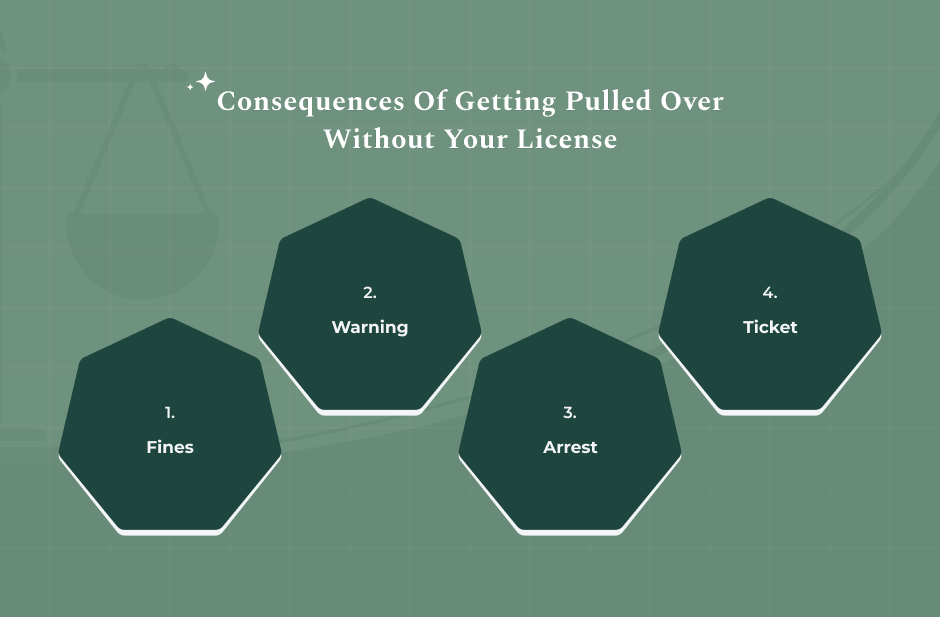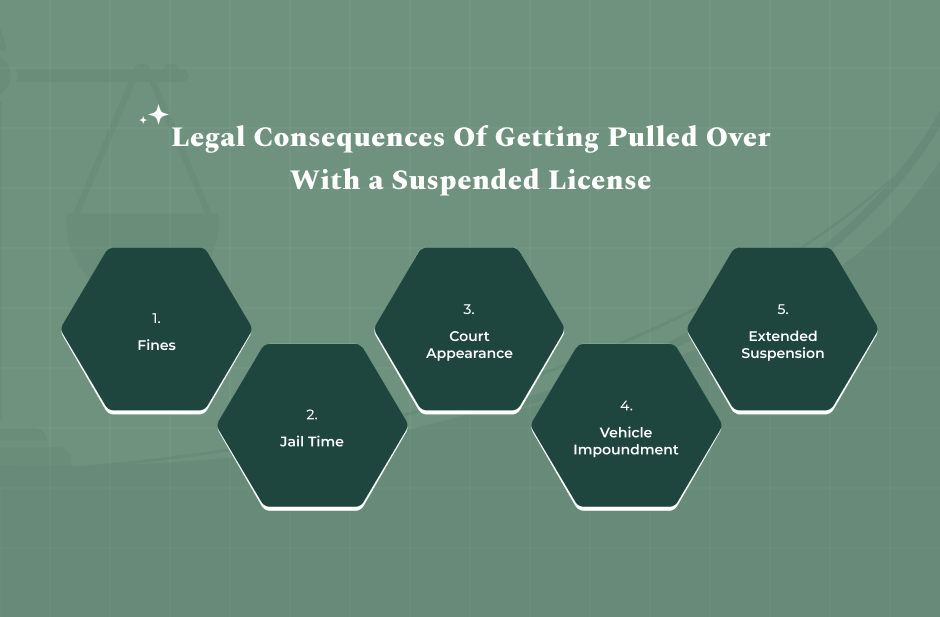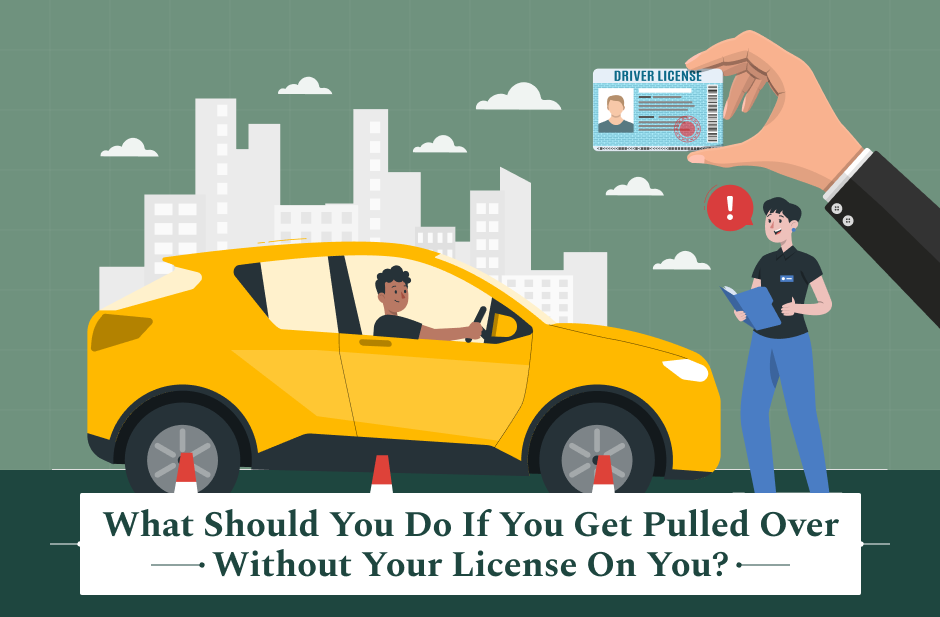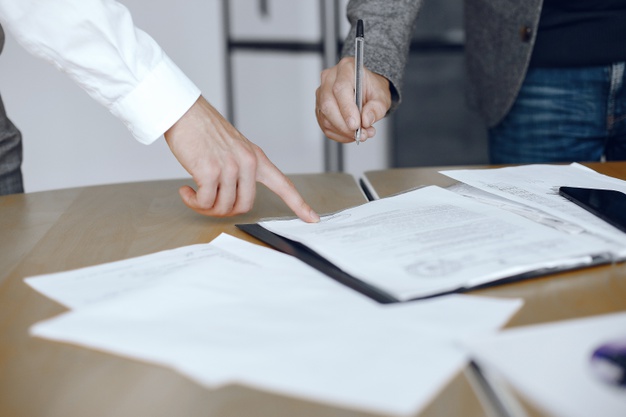Getting pulled over while you are simply going about your day can be puzzling in itself. But what happens if you get pulled over without your license on you?
Ever rushed out the door, got in your car, and halfway through the drive realized… you forgot your wallet?
It happens to the best of us. But what if a police officer pulls you over, and you don’t have your driver’s license with you?
Your license isn’t just a card with your photo on it—it’s what proves that you’re allowed to drive. And when a cop pulls you over, it’s usually the first thing they ask for.
Now, don’t panic. Forgetting your license isn’t the end of the world, but it can cause trouble depending on your situation. Were you really licensed? Was your license suspended? Did you never get one at all?
In this article, I will explain a few things to you about what might happen if you get pulled over without your license. Additionally, I will also tell you what are the kinds of penalties that you might face and whether (or not) you would need a lawyer!
So, if that’s what you want to know, keep on reading till the end…
What Happens If You Get Pulled Over Without Your License On You?

If you’re pulled over and you realize your license isn’t in your pocket or wallet, don’t lie and don’t panic.
Here’s what usually happens:
| You forgot your valid license at home | You might get a small ticket or warning |
| You have an expired license | You could get a fine and maybe a court date |
| You never had a license | This is more serious and might get you arrested |
| You have no ID on you | You may be held until they confirm who you are |
If your license is just at home, here are a few things that might happen:
- You’ll probably be asked for your name, address, and date of birth.
- The officer will look up your record.
If everything checks out, you might get a “fix-it” ticket. And what does THAT mean? Well, this means you can show your valid license later in court or at the police station. And if you really have the license, they may cancel the ticket. Still, you could be fined a small amount (like $25 to $250, depending on where you live).
Penalty for Driving Without a License
Let’s be clear: there’s a big difference between forgetting your license and never having one.
Here’s how the penalties stack up:
You have a license but forgot it:
- May get a small ticket
- Ticket might be dismissed if you prove you have a valid license
- Small fine possible
- No criminal charge
You’ve never had a license:
That’s a legal problem. You might face:
- Fines: $100 to $1,000
- Court appearance
- Possible arrest or criminal charge
- Points on your driving record
- Car could be towed
- Community service or even jail time in some cases
Driving is a privilege, not a right. You have to earn it by showing you’re responsible behind the wheel.
Here’s a little chart that might make it easier to understand:
| Situation | Possible Fine | Court | Jail | Car Towed |
| Forgot License | $25–$250 | Maybe | Unlikely | No |
| Never Had License | $100–$1,000 | Yes | Yes (sometimes) | Maybe |
And remember—if you’re driving without a license and you run a red light, speed, or cause an accident, your penalties could go way up.
Additional Penalties for Driving Without a License
Driving without a license isn’t just a one-and-done situation. If it happens again—or under risky conditions—these extra penalties may come into play:
You may have to face the following things:
- Vehicle impoundment: Your car could be towed.
- Probation: You may be placed under legal watch for a while.
- Higher insurance rates: Your insurance company might raise your prices—or drop you completely.
- License delay: If you’ve never had a license, this offense might delay your ability to apply for one.
Each state has different rules, but the message is clear: don’t drive without your license!
What Happens If You Get Pulled Over With a Suspended License?

Now THIS is much more serious than simply forgetting your license.
A suspended license means you used to be allowed to drive, but now you’re not—at least for a while.
Why?
Well, TBH, there can be several reason! Maybe the police caught you driving under the influence (DUI), or probably you didn’t pay traffic tickets. Or maybe, you broke some laws.
So, is it a crime to get pulled over with a suspended license?
Yes it is actually a crime. If the police officer finds you driving with a suspended license there are a few things that can happen. They are as follows:
| Fines | $250 to $2,500 depending on the state |
| Court Appearance | Almost always required |
| Arrest | Very possible |
| Vehicle Impound | Yes, they might tow your car |
| Suspension Extension | They could make your suspension longer—or revoke your license entirely |
In some states, this might be a misdemeanor. In others, if it’s your second or third time or you caused an accident, it could even be a felony.
So, what’s the bottom line? Well, that’s pretty simple! If your license is suspended, do not drive. Wait until you’re legally cleared.
Your Legal Guide: Who Can Help You If You Get Pulled Over Without a License?
If you get pulled over without your license, here’s what to do right away:
- Stay calm.
- Be honest.
- Cooperate.
- Don’t argue.
- Follow up.
However, if you are driving on a suspended license or have never had one, it’s time to consult with a lawyer.
Here’s why you might just need a lawyer:
- To understand your rights.
- They know how local laws work in your state.
- They might help reduce your penalties.
- Some even offer free consultations.
A lawyer can make a big difference—especially if you’re scared, confused, or facing a court date.
Let’s wrap it all up with a quick checklist, shall we?
| Do’s | Don’ts |
| Always carry your driver’s license when driving | Don’t drive if your license is suspended |
| Be honest and polite with the officer | Don’t lie to law enforcement. |
| Show your license later if you forgot it at the time | Don’t ignore a ticket or court notice |
| Ask for legal help if things get serious | Don’t assume the rules are the same in every state |
Many drivers are forgetful when it comes to their license which they often leave at home and is a major mistake. However, the way you deal with it can still turn the situation around.
Suppose you are just going for a drive and are legally licensed but forgot it; then, most probably, you will get by with a warning or small fine.
However, if you had never been licensed or if your license had been suspended, then here is a legal matter, and you could be in real trouble.
Do not forget that your license should be with you at all times. And if a difficult situation arises, however, speak to a lawyer immediately because they are there to support you.
Read Also:
















